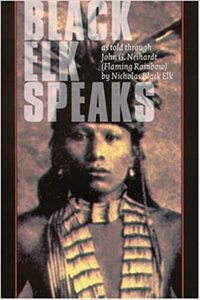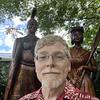Take a photo of a barcode or cover
156 reviews for:
Black Elk Speaks: Being the Life Story of a Holy Man of the Oglala Sioux
Black Elk, John G. Neihardt
156 reviews for:
Black Elk Speaks: Being the Life Story of a Holy Man of the Oglala Sioux
Black Elk, John G. Neihardt
I was trained to give historical documents with a critical eye so I can't help but note that this is a document that was first transcribed and then edited for clarity and tone of voice. The appendix at the back gave an example of how they changed it and I understand why they did it. For the general public it is easier and the heart and intent of the project is there, but for all I know, there may be things omitted not by purpose but because of differences in culture between the speaker and the editor.
I enjoyed this book greatly and it reminds me of the few times I have had the opportunity to hear an elder tell a story or speak of their experiences. I love the songs even though there is no music included. It offers the intent of the singer and reminds me again of the few songs I have learned. I smell sage when it is mentioned and the historical part of me enjoys the description of men/women roles. There is much within this book that does speak to me and I am thinking I may not pass it on as I had been thinking but buy another book to pass along and keep this copy for myself.
I enjoyed this book greatly and it reminds me of the few times I have had the opportunity to hear an elder tell a story or speak of their experiences. I love the songs even though there is no music included. It offers the intent of the singer and reminds me again of the few songs I have learned. I smell sage when it is mentioned and the historical part of me enjoys the description of men/women roles. There is much within this book that does speak to me and I am thinking I may not pass it on as I had been thinking but buy another book to pass along and keep this copy for myself.
informative
reflective
sad
slow-paced
I read it in school and I think that it's an important book for people to read so they can know more about American history.
Graphic: Death, Violence
Moderate: Racism, Colonisation
informative
reflective
sad
medium-paced
Been very much enjoying the Native American reads I've been on lately. This one is a little hard to follow as an audiobook just with the information being shared and remembering who is speaking, and I am always wary of Native stories being told by non-Native authors, but it was beautiful and heartbreaking to get to hear a story of their culture and the ways it was brutally stripped from them.
This book is something I have heard about for years being published first in 1932. I have been curious to read it, but I have a few reservations about this book. It is supposed to be the memoir of an Oglala man, but it was written by a non-Indigenous person who did not speak the Lakota language. Black Elk did not speak English so his son, Ben, translated for him. I find that sad in and of itself. I doubt that Ben is the name he was given at birth. He spent 2 years at the infamous Carlisle boarding school where the motto was "Kill the Indian to save the man." Children were routinely abused and forced to cut their hair and punished for speaking their native language. This is not addressed in the book, but I couldn't help but think about it as Black Elk talked about all the treaties that were broken and how they were fed lies when they were promised food. It talks a lot about encroachment on their traditional lands and about the annihilation of the bison that the Lakota had always depended on. Black Elk was 13 years old when he was at the Battle of Little Bighorn. It didn't discuss a lot of what led up to that battle, but it did talk about later incidents where soldiers shot into tepees without regard for who might be in there. It also describes the massacre at Wounded Knee after what has become known as the Ghost Dance. The historical parts of the book seemed to fit what I know about the history of the Lakota people and the Western expansion. However, I am skeptical about other parts of the book. I know the book has been somewhat controversial, and that it has been seen as questionable by members of the Lakota nation. The bulk of the book was about Black Elk's great visions and the miraculous powers he was endowed with. The problems that I have are with the great detail that the author has gone into about the visions and the ceremonies they inspired. I question that Neilhardt was able to understand so much detail, especially since he admits to adding what he considered to be chronological coherence and clarity. It seems he also left out about 40 years of Black Elk's life and the fact that the recollection of his great vision was now in light of his conversion to Catholicism. Some Lakota people say it is not a true representation of their beliefs. I wondered about that since the book always speaks highly of Catholic representatives in spite of the contention that sometimes occurred between Natives and the church. I also question why this book claims to teach truths as universal as those taught by Christ, Buddha, various saints, and other religious leaders. I kept trying to see what was universal about the vision to protect the Lakota nation from colonial encroachment. I would like to know more about Black Elk's life and not as much as the possibly elaborated mystical experiences portrayed in this book. I'm not sorry that I read this book, but I would certainly take a lot of it with a grain of salt
adventurous
emotional
inspiring
reflective
sad
medium-paced
Beautiful to read how things once were. Heartbreaking to see how we are now. Especially poignant for someone who knows those plains and hills.
I liked the book, although my expectation level my have been too high. It does tell a rather an amazing story, being a Wounded Knee Massacre survivor in itself is amazing, not to mention the recounting of his travels both in America & Europe. The book does EMINATE sadness - for the loss of an entire people's culture, religion and home. Given the massacre occurred in 1890 & the virtual destruction of the culture culminated less than 125 yrs ago, is also a sad statement at how harsh human beings have always been, as well as how we refuse to learn anything from the past. Especially bitter is the fact that 250 years ago many of the native Americans fought with the original 13 colonies against the British. The stories from his youth give some, but not as much insight as I expected into their religion which I believe was not based on the greed & conquer call that most of our "modern" religions are historically ladened with.
Not quite the book I expected. It’s more autobiography than a sacred text. Well worth reading despite the controversies surrounding the book. Is it accurate and representative of the Sioux because it was a white man transcribing the story? I think it’s pretty good. Need to read up on it more.
I did not care for the format of this book and preferred my recent reading of Crazy Horse!
Black Elk's story, and that of his people, is utterly tragic. However, the very large quantity of statements that Neihardt either changed or purely invented was a big detraction for me in this book.




